
A Work in Progress: An Interview with Frank Darabont
October 12th, 2004
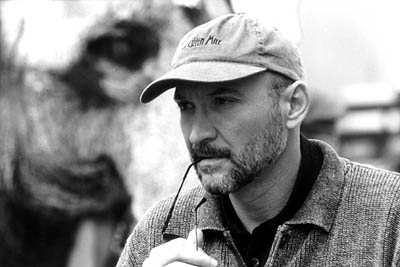
DVD fans have waited five years since The Shawshank Redemption (click here to purchase at a DISCOUNT) first came out for a proper special edition treatment. Now, for the film’s 10th anniversary, writer/director Frank Darabont has put together two discs of commentary and interviews.
Darabont made generous time to speak about the re-release. Originally scheduled for 10 minutes, he offered to extend it to 30, so we had plenty of time to discuss writer’s issues, The Shawshank Redemption, and his recent rewrite work on high profile projects like Indiana Jones IV and Mission: Impossible 3.
We even had time to talk about the weather. Darabont opened by chatting about what a nice day in Los Angeles it was. This is an example of how conversational the man is, that even over a telephone line, we could make a personal connection to begin a significant discussion.
What is your daily writing schedule?
Wake up in the morning, sit on my ass, stare at the computer as quickly as I can. Maybe try to get a workout in, but the key to it is not getting distracted. So yeah, that’s first thing in the morning and I’m usually there for eight to 10 hours a day.
Is the workout to think about scripts or to clear your head?
It depends. If I’m dealing with something, wrestling with some kind of thorny problem, that’s a great way to help step away from it. I’ll take a walk up on the hill or whatever, just get out and let my mind float around the problem rather than trying to attack it directly. And I’ve gotten some wonderful insights that way. And then at other times, it’s just wonderful to get away from a period and put my head somewhere completely else.
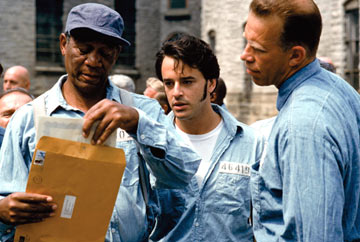
Why do you enjoy the adaptation process?
I don't know if I enjoy it. It’s something that I seem to be pretty good at. As opposed to…
As opposed to originals.
Some of us have great original ideas and some of us depend on adaptations. If I have anything that can be deemed a weakness, it’s that I don’t have that. I don’t have a head full of ideas I’m dying to write. I’m usually responding to the stories that I’ve read. I’ve at times had people look at me with something approaching pity, saying oh, poor you, when are you going to do something original? I say, well, when did Kubrick? Not that I’m comparing myself to Stanley Kubrick.
Is script doctoring and rewrite work equally rewarding?
No, not at all, which is why I have quit that as of MI3. Indiana Jones is not the reason, but a reaffirmation of a decision that’s been coming for a while. I won’t say I’ll never do it again because that’s silly. But it’s been sort of a career focus for 18 years now, writing for other people. And I’ve come to a place where I’m really very anxious to be focusing on getting my own movies made and not wrestling with other people’s problems and other people’s deadlines. It’s been a great run of good fortune for me as a writer. I mean, how many people can claim an 18 year career? But for now, I’d like to put that on the backburner for the first time, so I’m turning down work right and left. I want to get my next movie made.
Why did it take 10 years to do the special edition of Shawshank?
Well, it took 10 years because I’ve been really busy. I know that sounds like a stupid answer, but the truth is I really have been crazy busy. I’ve directed two other movies and done an enormous amount of work as a screenwriter. And let me tell you, when you’re meeting deadlines like that, years just go clicking by. The day comes when you realize, “Oops, we’re coming up on our 10 years anniversary. Maybe now’s the perfect time to do that.” So that’s the thought that hit me last year and I said, “Okay, let me put my attention on this now and kind of get this ball rolling.” We could have done an indifferent one I’m sure, but on stuff like a director’s commentary, I don’t want to just toss it off in an afternoon. I know that a lot of people do that, but I really wanted to give it its due and in order to really do the commentary right, I needed a week. I needed a week of my time to apply. So that’s really the true answer. I wanted to do it right and not half assed.
You weren’t any less busy in the last year or two, where did you make the time?
Yeah, that’s true. It was a matter really of forcing my schedule in order to accommodate it.
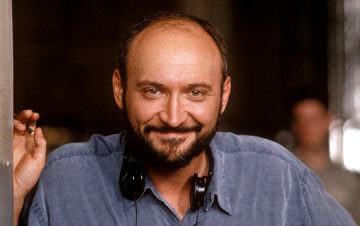
Have your thoughts changed in the last 10 years?
Well, yeah, insofar as gosh, I’m glad people like it now. I mean, they always liked it. That’s a silly answer. They always liked it, but it’s become something that from a movie that people were reluctant to give a chance at first on its initial release, it’s become something that people not only have given a chance but also really embrace. So it’s risen in people’s estimation to a point where it’s got this wonderful life of its own now. So from that standpoint, yeah. When I look at the movie itself, I still think the same thing of the movie that I did then, which is I think it’s a movie I’m proud of. I think it’s a really satisfying film. It did the job that I set out to do. I think it holds up pretty well.
How many times did you go over the film in the week of commentary?
What I would do is from the first session of recording, I would have them send the commentary to me the way it was laid in and I’d sit and listen to it and make notes, find out where the gaps were, find out where I didn’t do a very good job. So I’d make these notes and editorial notes as well for the guy who was editing it. Then I’d go back in and do another session and try to improve on what I had done and also to fill in those gaps. I don’t like commentaries where there’s too many dead spots because it just makes it seem like they didn’t really have anything to say. So I wanted to fill those gaps and really come up with something worthwhile. If somebody’s been interested in listening to what I have to say about this movie and waiting for 10 years, I want to make it of value. If not for the money, at the very least for the time.
Is it usually done that way?
No. The guys I was working with said, “Most directors come in here and they spend two hours and they kind of wing it, then they leave. And it’s the last we hear of it.” So I think to spend a week is a little unusual.
Have you been saving up anecdotes for it?
Yeah, probably so. More than that, it was really fun to look back at the movie and do my homework before we started recording. I’d sit here at home and watch the movie and think, “Okay, if I were sitting in a class of, say, film students or just fans of the movie, what would I say that might be of interest to people?” And those anecdotes inevitably do arrive when you’re thinking about that.
Do people still mispronounce the title?
No, not much anymore. I think finally after 10 years, it’s been enough time for them to get it right. Although I do have one dyslexic friend who still calls it Shankshaw. She’s known the movie for 10 years now.
Does the longevity the film has had make up for losing to Forrest Gump?
That longevity makes up for everything. [LAUGHTER] Everything. Underline everything. It’s a very interesting experience to put almost two years of your life into a movie, into something that you really believe in, really care about. And it’s really not an easy process to make something and then release it to theaters and have nobody want to show up. That’s a really interesting experience and a very disappointing one as you can imagine. To have it then go on to become what it’s become for people is beyond validating, beyond redeeming for me.
When it clicks so right the first time, does it make the subsequent projects harder?
I think that by the time I got to do Green Mile, which was maybe five years later, yes, you’re absolutely right. I had gotten a real sense of Shawshank being something special or even more than I had intended possibly. So it did cast a shadow, but I didn’t want to stand in that shadow. I thought I could either be paralyzed by seven Academy Award nominations and this thing meaning so much to so many people, or I could just go ahead and continue doing what I do, try to tell the story as well as I can. So once I got into The Green Mile, I just kind of dispelled it and didn’t really think of Shawshank.
Why do Stephen King stories make such great movies?
Well, how nice that you would ask that questions because for a while, people would have asked why do they make such crappy movies? He did not have the best reputation I don't think. There were a hell of a lot of movies that weren’t that good. I’m glad that stuff like this and The Green Mile and Dolores Claiborne and Stand By Me have brought Stephen King properly into focus as a storyteller.
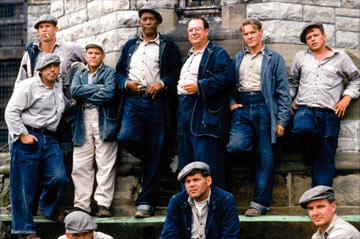
But that’s a misperception. There were some schlocky ones, but even Carrie was well received.
Yes, it was absolutely and frankly Dead Zone is one of my all time favorites.
And The Shining?
Yeah, The Shining. It has been a misperception, so I love that these other movies have sort of corrected that misperception.
What’s funny is the great ones aren’t horror.
Yes, I know, isn’t that funny? That’s because, if I may float a theory here, the ones that haven’t been horror have focused upon Steve’s ultimate strength, which is his depth as a storyteller, his facility with characters. The one that have the more obvious horror element, filmmakers tend to focus on those elements and jettison the stuff that makes his work so compelling to so many readers, which is the character driven. So it depends on what the filmmakers’ focus is really, I think. With something like Shawshank, there are no fur and things to get distracted by. It’s just a great human story.
But so often, the ones we’ve mentioned go right. There must be something about material itself.
Your guess is as good as mine on that one. I’m just glad people think these went right, the ones I made. That’s an awesome feeling.
With Indy IV, what was the problem Lucas had with the third act?
I have no idea and I’m not being coy, believe me. I’ve not heard anything about the third act or anything else. All I know is that I developed the script with Steven and that he was very happy with it and George was not. And so I got stuck in that crack between two very significant opinions on this project. So to my knowledge, I have no idea what’s going on.
Was it a fun experience?
It was an incredibly grueling experience working on that film. I spent over a year working nonstop on that, developing the script with Steven and feeling like I really had something special to live up to as a writer. So for me, it was an enormous amount of pressure to get it right. Consequently, a very interesting and disappointing experience to have Steven think I got it right and George not. But hey, as they say in The Godfather, this is the business we have chosen. Things turn out, sometimes they don’t.
As a fan, wasn’t it thrilling to be in charge of Indy’s adventure?
From a creative standpoint, absolutely thrilling. It was incredibly satisfying which makes of course the end results all the more disappointing. Let me put it this way, as a fan myself, and I’m talking a real hardcore Indiana Jones fan, the movie I wrote is the movie I wanted to see. It was the one that would have satisfied me most. So who knows what’s going to be the result of that. I’m sure it will have, even if it’s great, I’ll have rather seriously mixed feelings about it.
Presumably, it will be 2/3 your script.
You know what? I take nothing on faith, buddy. There might be one line of dialogue left of me by the time it’s all said and done.
How different was the MI3 experience?
Mission Impossible 3 was actually a total gas for me. It was really fun. There was a shape to it when I came on the project. They had a very strong idea when I came onto it. I can’t say that about Indiana Jones. That was sort of developed along the way with Steven. So I was brought in really as a script doctor. I came in on MI3 with something already in place really, and took it from there and did three drafts for Tom on that. And working with Tom was just, I have to say, just a stone pleasure. He is a great guy and a smart, creative guy too. That was really, really fun.
Had you finished when Carnahan left?
No, I was in the middle of my third draft when Carnahan walked.
But your main collaborator was Cruise?
Well, at that point, on that third draft, our collaboration on the first two drafts was really very much equal I think with Tom and with Joe. Ultimately, whatever creative differences there might have been that led to Joe walking off the project, I was unaware of. I thought I was pleasing all parties. I thought we were all on the same page, so it came as a real surprise to me actually when Joe walked. I’m sorry I can’t give you more insight into what Joe’s reasons were but I don't know what they are.
With J.J. Abrams on board, was there any talk of staying to work with him?
No, not really. At some point, I got the sweetest note from J.J. It’s a big project as you can imagine. He sent me a very gracious note. I had pretty much done my third draft by the time J.J. came on and I’m anxious to move onto other things. I’ve got The Mist to write this year. Who knows, at some point they might call me back in for something which I’m sure I’d be happy to do, but who knows? At this point, the script might be close enough for J.J. to do whatever polishing he needs to do on his own. That would be fine.
How different was writing for Ethan Hunt vs. Indiana Jones?
Well, you don’t want to go too far afield with a character like Indiana Jones. You want to keep it somewhat real but my God, there’s certainly an element of the fantastic with Indiana Jones that you lack with Ethan Hunt. With Ethan, there’s much more of a grounding in reality.
Even with all the technology and gadgets?
Yeah, absolutely. The fascinating thing about this third one is it’s a much more realistic and much more gritty approach to a Mission Impossible movie than has been seen before. It’s much more pure feeling and much less operatic than the first two. I think it’s a terrifically smart direction to take the series.
Have you had any time for Fahrenheit 451?
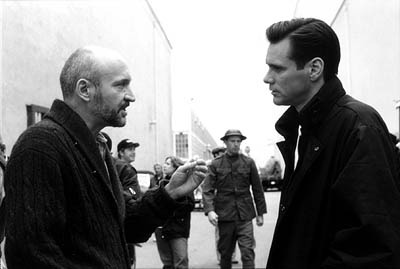
I have in fact finished my adaptation of Fahrenheit 451. I think it’s the best script I’ve ever done. Now it’s a matter of trying to find a home for it and getting somebody to cough up the dough to make it. That’s always the challenge. Particularly with something that’s that politically charged as Fahrenheit 451.
Has it become a commentary on current politics or is it still based in the period it was written?
It is definitely based in the period that Bradburry wrote it. It’s still very much a futuristic piece, but Bradburry wrote that as a metaphor for what was going on in this country during the Macarthy hearings. So its relevance has come back around again. It’s never not been relevant, because there are always forces lurking under the skin of democracy that want to turn us all into mindless robots. That’s become all the more relevant now.
Have digital advances in technology changed what you’ll be able to do?
Oh God yes, absolutely. There are things in Bradburry’s story that couldn’t be done once. In fact, Truffaut’s version which I was never a big fan of, lacks certain iconic things about the story. They couldn’t do, for example, the mechanical hound. The robotic dog is something they didn’t even try to do.
Are you worried a studio will ask you to change the title because they’re worried it’ll be confused with Michael Moore’s film?
I suppose that there’s always that possibility but I really don’t think that that’s going to be a problem because let me put it this way. I was also involved with Collateral and everybody was so worried about that being the title of the movie because of the Schwarzenegger movie Collateral Damage. Oh gee, are people going to confuse it with that.
That wasn’t as big as Fahrenheit 9/11.
Well, yeah, ultimately a few years later, people are hard pressed to remember that there was a movie with a similar title. And this one clearly have Tom Cruise in it and it’s a Michael Mann movie. It brings its own identity to the thing. I really don’t think that by the time we’re trying to get the audience to see Fahrenheit 451 they’re going to be confused with Michael Moore’s movie at all.
Is The Mist for you to direct?
Yes, it is. Which is something I’ve been wanting to get around to for about 10 years.
Do you have a preference for which would go first?
I think in a perfect world, Fahrenheit. It’s a particularly timely piece now. Look, the true answer is The Mist is something I’ve been wanting to do for 10 years. Fahrenheit’s something I’ve been wanting to do since I was nine years old and I first read Bradburry’s book. So that’s a lifelong dream, that movie.
Will that complete your Stephen King trilogy or will you always look at King?
I will always look at his work. I’ve got a few other things along those lines that I’m getting to.
Would you mention those?
For now, I’d rather not.
Will you focus on the sci-fi monsters or the human story?
Well, if you focus on the human story, everything else is gravy. What I love about The Mist is how character driven it is. It’s a really heated human situation. That’s really where the story is. It’s not so much with the monsters outside.
Is that set up at a studio?
That, I’m going to be starting to write that for Paramount actually. I will not forsake the monsters though. That’s part of the fun.
More recent articles in Interviews
Only logged-in members can comment. You can log in or join today for free!
Advertisement






